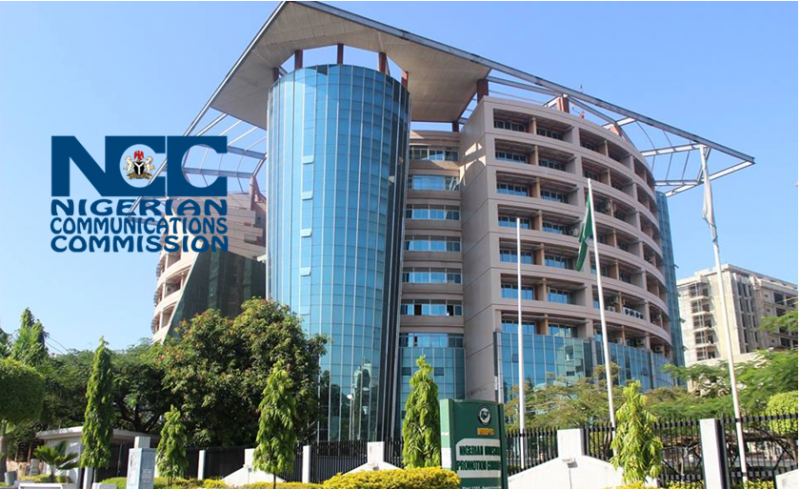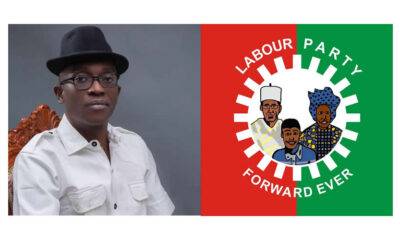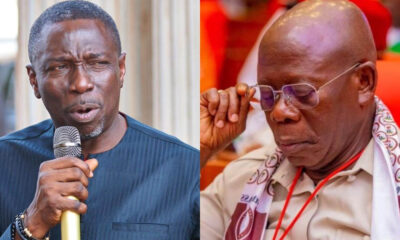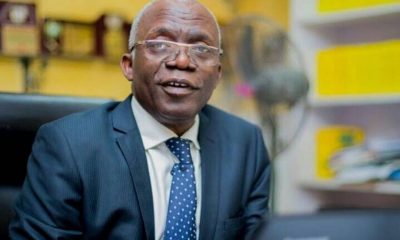Business
Tinubu’s Naira directive will cut foreign exchange reliance, says Otedola

Tinubu’s Naira directive will cut foreign exchange reliance, says Otedola
Billionaire businessman, Femi Otedola has praised President Bola Ahmed Tinubu’s directive for the adoption of the Naira in crude oil trading within Nigeria, calling it a “game-changing intervention” that will significantly reduce the country’s reliance on foreign exchange.
Tinubu directed the Nigerian National Petroleum Corporation (NNPC) to immediately commence engagement with local refineries in transactions dominated in Naira.
Otedola on his X account said this move, adopted by the Federal Executive Council (FEC), aims to stabilise both the pump price of refined fuel and the dollar-Naira exchange rate by selling crude oil to Dangote Refinery and other upcoming refineries in Naira.
READ ALSO:
- BREAKING: Gunmen kill four policemen, PoS operator in Imo
- Admission: Daily part-time programmes illegal — JAMB
- Sokoto: Bandits ambush travellers, kidnap monarch, son, 5 others
“Dangote Refinery currently requires 15 cargoes of crude, at a cost of $13.5 billion yearly. NNPC has committed to supply four.
“But the FEC has approved that the 450,000 barrels meant for domestic consumption be offered in Naira to Nigerian refineries, using the Dangote refinery as a pilot. The exchange rate will be fixed for the duration of this transaction,”
Otedola emphasised the expected market stability this initiative will bring and noted that Afreximbank and other settlement banks in Nigeria will facilitate the trade between Dangote and NNPC Limited.
He highlighted the importance of this move in streamlining the process, ensuring smoother transactions, and reducing reliance on foreign exchange.
“This initiative is crucial for our economy. It will ensure the stability of fuel prices and the Naira, ultimately benefiting the Nigerian populace,” Otedola remarked.
Tinubu’s Naira directive will cut foreign exchange reliance, says Otedola
Business
NCC moves to boost internet speed with 6GHz spectrum

NCC moves to boost internet speed with 6GHz spectrum
The Nigerian Communications Commission (NCC) on Thursday said it has begun moves to harness 6GHz spectrum for improved internet speed in Nigeria.
The Executive Vice Chairman of the Commission, Dr. Aminu Maida, disclosed this during a Stakeholders’ Consultative Forum on Emerging Technologies in Lagos.
The 6 GHz spectrum is a band of radio frequencies that offers several benefits for wireless communication, including faster data rates and transmission speeds than previous bands.
According to the EVC, deploying this higher spectrum became necessary as the current 5GHz and 2.4GHz bands are facing capacity constraints.
Growing demands for speed
Maida, who was represented by the Executive Commissioner of Technical Services at NCC, Abraham Oshadami, said the move would address the growing demand for high-speed internet.
He added that Nigeria would be joining the league of countries already utilizing part of the 6GHz band for Wi-Fi -6 applications.
READ ALSO:
- Pension bill: Police retirees to embark on protest
- Actress Adunni Ade speaks on cab driver lawsuit threat
- Canada plans to cut foreign student visas
“The 6GHz band, spanning from 5925 MHz to 7125 MHz, offers a substantial increase in available spectrum, which is crucial for supporting the growing demand for high-speed internet and advanced applications.
“Wi-Fi plays a crucial role in the distribution of fixed broadband connectivity in homes, offices, and various other environments.
“The vast majority of home internet traffic is connected to the end-user through Wi-Fi.
“In enterprise settings, Wi-Fi is essential for handling large amounts of data and simultaneously connecting large numbers of devices with improved reliability, higher data throughput and lower latencies,” Maida said.
Overcrowded airwaves
Similarly, the Head, of Spectrum Administration at the NCC, Atiku Lawal, said that the overcrowded airwaves were currently limiting the potential of Wi-Fi in the 2.4GHz and 5GHz.
- Lawal said that it was not a surprise that more than seventy countries had already acted, or were considering acting on opening the 6GHz band for unlicensed Wi-Fi use.
- He noted that depending upon the country’s implementation plan, this decision would provide two to three times the spectrum available today.
- This is also expected to result in the ability to implement 80MHz and 160 MHz channels being available for the new Wi-Fi 6 standard ideal to support digital transformation efforts and use cases like high definition video and X Reality (XR).
“The commission’s decision to open the 6GHz frequency band for unlicensed Wi-Fi use is poised to revolutionize broadband connectivity in Nigeria.
READ ALSO:
- Edo poll: Court gives fresh order on APC candidate Okpebholo
- JUST IN: Edo declares Friday work-free day for gov election
- Ganduje not plotting to dethrone any Kano Emir – Aide
“This move will significantly enhance internet services, providing faster and more reliable connections. With the advent of Wi-Fi 6, users can expect higher data rates and increased capacity, making it ideal for high-demand environments such as stadiums, airports and offices,” he said.
He added that by offloading devices from cellular networks to Wi-Fi 6, the NCC aims to improve overall quality of service, alleviating capacity constraints and boosting broadband penetration in Nigeria.
Operators’ request
While commending the NCC, the Chairman of the Association of Licensed Telecoms Operators of Nigeria (ALTON), Gbenga Adebayo, pleaded with the Federal Government to assist operators in upgrading to the new spectrum.
- He said the appeal was coming because operators struggled to expand their networks.
- Adebayo, who was represented by the Executive Secretary, ALTON, Gbolahan Awonuga, said the telecom operators are not isolated from the harsh financial ecosystem.
“We need money to upgrade our infrastructure and import equipment, so as for us to benefit from the 6GHz.
“Our members are struggling to expand their infrastructure. We appeal to the federal government to come to our aid.”
NCC moves to boost internet speed with 6GHz spectrum
Business
CBN reintroduces controversial cybercrime levy on all e-transactions

CBN reintroduces controversial cybercrime levy on all e-transactions
Bank customers of several commercial banks are in a state of confusion currently following the recent release of the fiscal guidelines of the Central Bank of Nigeria (CBN) which revealed that it will continue to enforce a reduced 0.005% levy on all electronic transactions.
The bank in its Monetary, Credit, Foreign Trade, and Exchange Policy Guidelines for Fiscal Years 2024-2025 document, revealed that as part of its 2024-2025 fiscal year guidelines, reaffirmed its commitment to this charge, requiring banks and other financial institutions to deduct the levy from all electronic transactions.
Scrutinizing the document, Daily Sun observed that the percentage has been reduced from 0.5% earlier announced in May 2024 to 0.005% in the new guidelines.
The apex bank noted that the levy is mandated by the Cybercrime (Prohibition, Prevention, etc.) Act of 2015 and added that the revenue generated from the levy supports a cybersecurity fund aimed at bolstering Nigeria’s defense against cyber threats, particularly in the banking sector. “The CBN shall continue to enforce the payment of the mandatory levy of 0.005% on all electronic transactions by banks and other financial institutions, in accordance with the Cybercrime (Prohibition, Prevention, etc.) Act, 2015”, it said.
The CBN’s guidelines also include provisions to ensure banks, Other Financial Institutions (OFIs), and Payment Service Providers (PSPs) comply with minimum cybersecurity standards, such as appointing Chief Information Security Officers (CISOs). These requirements stem from a 2022 risk-based cybersecurity framework that targets the growing threat of cyber attacks.
READ ALSO:
- Osun: Police arrest suspected Yoruba Nation members
- Suspected car thief nabbed in Niger State
- Police arrest DSP, inspector over manhandling of Lagos elderly woman in viral video
It will be recalled that the introduction of the levy had sparked controversy, with critics arguing that it adds unnecessary costs to businesses and could fuel inflation. The Centre for the Promotion of Public Enterprise (CPPE) and the Nigerian Association of Chambers of Commerce, Industry, Mines, and Agriculture (NACCIMA) had urged the government to cap the levy to mitigate its economic impact.
In response to these criticisms, the Federal government, through the Minister of Information, and the Federal House of Representatives called for a suspension of the levy pending further review.
Similarly, the CBN pulled the plug on the collection of levy, but the latest guidelines suggest that the CBN is determined to press forward with the levy despite the opposition.
An economic experts, who did not want his name printed, stated that the CBN could have released such guidelines as part of broader measures aimed at bolstering cybersecurity across financial institutions, especially given the rise in cyber attacks targeting the financial sector.
He however stated that it would be unusual for a central bank to impose such levies directly, as cybersecurity measures are generally handled through regulatory requirements or sector-specific compliance measures.
“I have looked at the guidelines too and I am a bit confused as to whether this has been reviewed thoroughly by the Federal Executive Council because the confusion could arise from how these guidelines were communicated or interpreted by different stakeholders like me.
Also, like I had said before, financial institutions, businesses, and perhaps even customers could be affected by this levy, depending on how it’s structured. Hence, further clarification from the CBN or the Federal Executive Council may be necessary to resolve the confusion surrounding the implementation of the levy”, he said.
CBN reintroduces controversial cybercrime levy on all e-transactions
Business
Suspend VAT, other policies impoverishing Nigerians – SMEs tell FG

Suspend VAT, other policies impoverishing Nigerians – SMEs tell FG
The National Association of Small and Medium Scale Enterprises (NASME) and financial experts have called on the Federal Government (FG) to suspend any new policy that may further impoverish Nigerians.
The unanimous call was made by respondents in separate interviews with the News Agency of Nigeria (NAN) in Ibadan on Tuesday.
The interview focused on the need to stabilise the economy as an increase in Value Added Tax (VAT) is being anticipated from 7.5 per cent to 10 per cent.
The Oyo State chairman NASME, Prince John Karunwi, said VAT, being a consumer tax, would make prices of goods and services shoot up.
According to him, the increase will deplete consumers’ purchasing power and reduce the quantity of items they can buy.
Karunwi said that the present situation had left most Nigerians without disposable income.
“The situation now is that after transportation, maybe people have little for feeding.
“If they now discover that for some certain products, the prices will go high, the demand for products that are not essential will, definitely, drop,” said the chairman.
He said the government should be patient and allow the economy to stabilise despite its drive to increase its internally generated revenue.
READ ALSO:
- Salary: FG vows to prosecute private employers paying below N70,000
- American govt approves Elon Musk’s Neuralink brain chip to restore vision
- Man remanded for allegedly defiling stepdaughter in Benue
An economist, Samson Olalere, said the idea to increase VAT at this point would further deepen the hardship of the common man.
According to him, people are already grumbling about the unwarranted fuel price increase and the high cost of living, as the new minimum wage increase is grossly inadequate.
He said the government should look inward and come up with ideas that would benefit the populace and reduce the hunger of common Nigerians.
“I say no to the increase in VAT. It is an abuse of the sensitivity of Nigerians,” said the economist.
Olalere wondered why the common Nigerian would be asked to sacrifice, tighten his belt, and keep faith in the government without enough consideration for him from the same government.
A financial expert, Sola Famakinwa, corroborated the opinions of others that an increase in VAT would amount to an increase in the prices of goods and services.
“There is no way the manufacturing industries would bear the cost of increased VAT; it would be passed down to the consumers.
“If what we hear about the proposed VAT increment is true, I do not think Nigerians can bear to have more burden added to their shoulders now,” Famakinwa said.
He noted that the government needed to reduce the economic hardship by introducing subsidies for necessities that directly affect Nigerians, considering that not all are government workers.
Recall that VAT was increased from 5 per cent to 7.5 per cent on Feb. 1, 2020.
However, the Presidential Committee on Fiscal Policy and Tax Reforms recently recommended an increase to 10 per cent from 2025, and to 15 per cent by 2027 or 2030.
Suspend VAT, other policies impoverishing Nigerians – SMEs tell FG
-

 Business3 days ago
Business3 days agoDangote refinery to transport 75% of fuel locally by sea
-

 metro2 days ago
metro2 days agoFour burnt to death, eight others injured in Ore-Ijebu Ode road crash
-

 Politics3 days ago
Politics3 days agoWhy I’ll work against Obi as running mate – Aisha Yesufu
-

 metro2 days ago
metro2 days agoUpdated: Controversial church testimony occurred in a dream, says Lord’s Chosen
-

 metro2 days ago
metro2 days agoLady laces food with laxatives to know those eating it
-

 Opinion1 day ago
Opinion1 day agoOgun Waterside: Path to political recovery
-

 Politics3 days ago
Politics3 days agoWe no longer recognise Abure as Labour Party chairman – INEC
-

 News3 days ago
News3 days agoIghodalo sues Oshiomhole for N20bn ahead of Edo election











